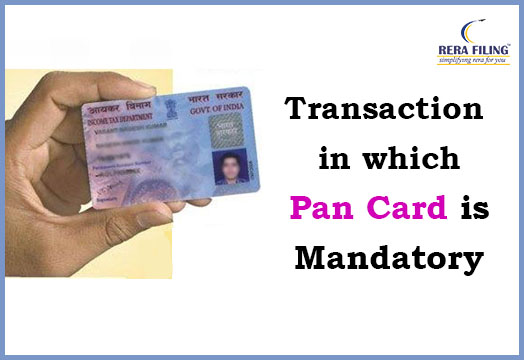Property transactions for which PAN Card is must

- Monday 3rd June 2019
- Author: Shreya Uppal
Highlights
Permanent Account Number (PAN) is a 10-digit alphanumeric number allotted by the Income Tax (I-T) Department to a person, and through this number, the departments track the financial transactions carried out by that person.
This is why it is mandatory to submit your PAN Card details to carry out most transactions these days. Since property transactions involve the exchange of large sums between the contracting parties, people involved in such transactions must have PAN cards.
Therefore, the property transactions for which PAN Card is must are given below: Let us understand from two different angles- from the Buyer point of view and from the Seller point of view.
Permanent Account Number (PAN) is a 10-digit alphanumeric number allotted by the Income Tax (I-T) Department to a person, and through this number, the departments track the financial transactions carried out by that person. This is why it is mandatory to submit your PAN Card details to carry out most transactions these days. Since property transactions involve the exchange of large sums between the contracting parties, people involved in such transactions must have PAN cards.
Therefore, the property transactions for which PAN Card is must are given below:
Let us understand from two different angles- from the Buyer point of view and from the Seller point of view.
Buyer point of view
1. Purchase of Plot- If the value of the plot exceeds Rs 5 lakh the buyer will have to submit his PAN for the registration purpose. In case the buyer is not a taxpayer and hence does not have a PAN, he may still request the sub-registrar to register the property by filing Form 60, along with your address proof.
2. Home Purchase- If the value of the deal is over Rs 50 lakh, the buyer will have to submit his PAN. In this case, the buyer will have to use his PAN to deduct and submit one percent of the transaction value as TDS (tax deducted at source), something the law mandates him to do. Without the PAN, the buyer would not be able to do that.
3. NRI Buyers- Non-resident Indians, whose income is not taxed in India, need not have a PAN. However, they must apply for a PAN if they are going to purchase a property. Depending on the use of this property, the buyer will have to file income tax or apply for the exemption.
Seller point of view
1. Sale of Plot- If the value of the plot exceeds Rs 5 lakh, the seller will have to submit his PAN for the property to get registered. Again, if the seller is not a taxpayer and hence does not have a PAN, he may still request the sub-registrar to register the property by filing Form 60, along with their address proof.
2. Home Sale- The seller must have a PAN to avoid taking several monetary hits, apart from the procedural hurdles. The buyer will have to provide the seller’s PAN details to deduct, submit and issue a TDS certificate to the latter. In case the seller does not have a PAN, the buyer is liable to deduct 20 percent of the deal value as TDS, in place of one percent. Also, property sellers have to pay long-term capital gains tax or short-term capital gains tax to the government on the profit they earn through the transactions. However, certain exemptions are allowed to the sellers if they use the sale proceeds to buy another property. To claim these benefits, however, the seller must have a PAN.
3. NRI Seller- If the seller is an NRI, the buyer has to deduct over 20 percent of the transaction value as TDS, depending on the deal value. This is basically an amalgamation of capital gains and TDS both. In case the seller is making short-term capital gains (if the property is sold within two years of purchasing it), the rate of tax would be 30 percent. Since TDS and capital gains tax would come into play, the NRI seller must have a PAN to complete the formalities and claim exemption.
Apart from the above transactions, tenancy transactions also require PAN.
1. Both Tenants and Landlords must have PAN in order to deduct and submit TDS. Also in order to claim exemption from paying TDS as they earn less than Rs. 2.4 lakh as annual rent will have to give their PAN details.
2. Tenants with NRI Landlords shall have to quote their PAN and the same is applicable to the NRI Landlords too.
More Articles
- Online Listing Tips for Real Estate Agents
- How to start a Real Estate business in India - a complete guide !
- Renting Vs Buying property - How will you decide?
- What you should do in Property Management services
- Home Loan Insurance
- How to choose your builder?
- How to ensure fire safety in your home!
- Tips To Keep In Mind While Taking A Home On Rent
- Importance of Home Security
- How to plan your property budget?
- Leased vs. Purchased vs. Co-Working Office Spaces
- Easy Tips to Build an Eco Friendly Home
- Sample Flat - A Trick by a Builder?
- How to have a Beautiful Guest Room? Impress your Guests with these Guest Room Ideas..
- Understanding MCLR and its Effects on Home Loans
- 5 simple ways to close a real estate deal
- Is it worth to buy property near an airport ?
- Home loan tax benefit
- How to be successful in business as an introvert
- Cost effective home decor ideas
- What to Be-Paying Guest or a Tenant??
- Complete guide to start your small business
- Sports township- New trend in India
- Online Listing Tips for Real Estate Agents
- Understanding Floor Area Ratio- FAR
- Town and Country Planning | Meaning and Importance
- Checklist of Important Property Documents- All You Need to Know
- Role of CREDAI in real estate
Copyright © 2023 RERA Filing. All rights reserved.
 Rera
Act
Rera
Act
 Maharashtra
Maharashtra Karnataka
Karnataka Andhra Pradesh
Andhra Pradesh Uttar Pradesh
Uttar Pradesh